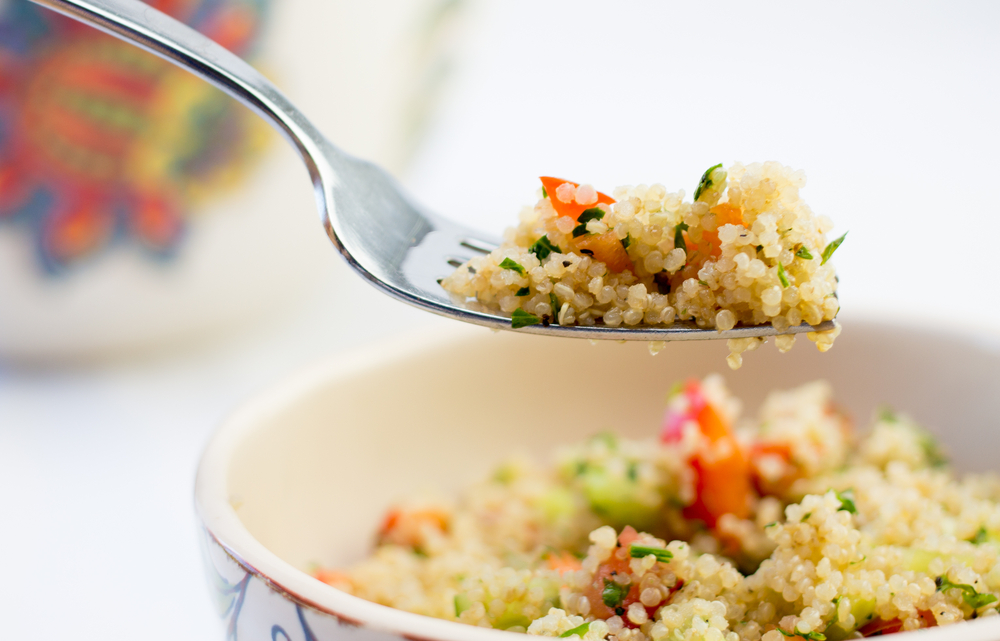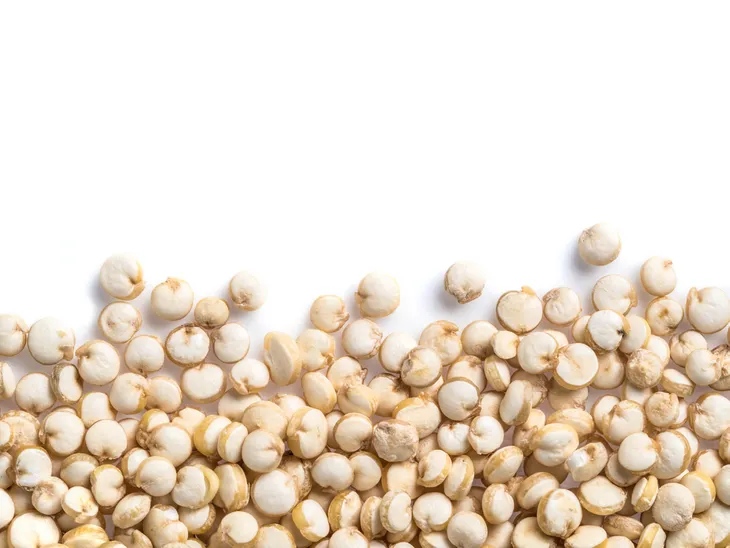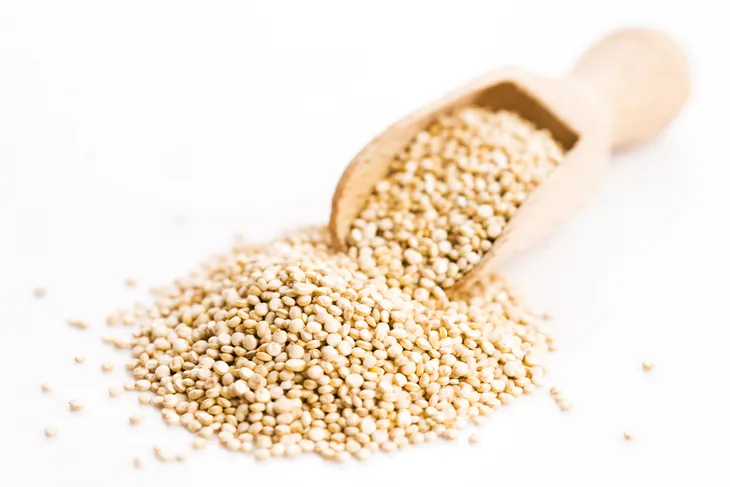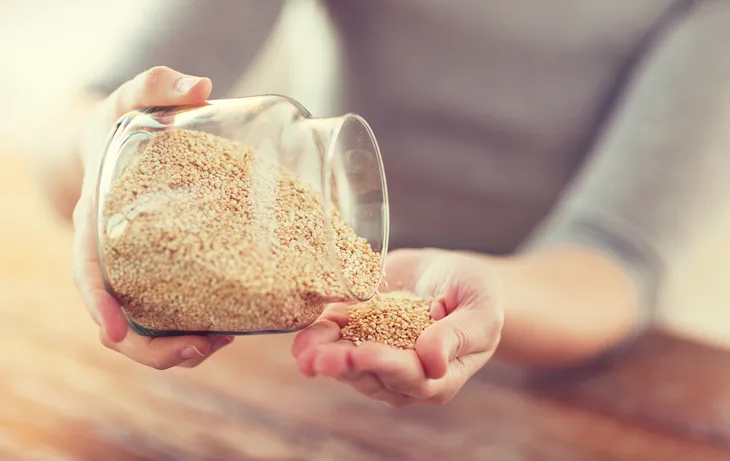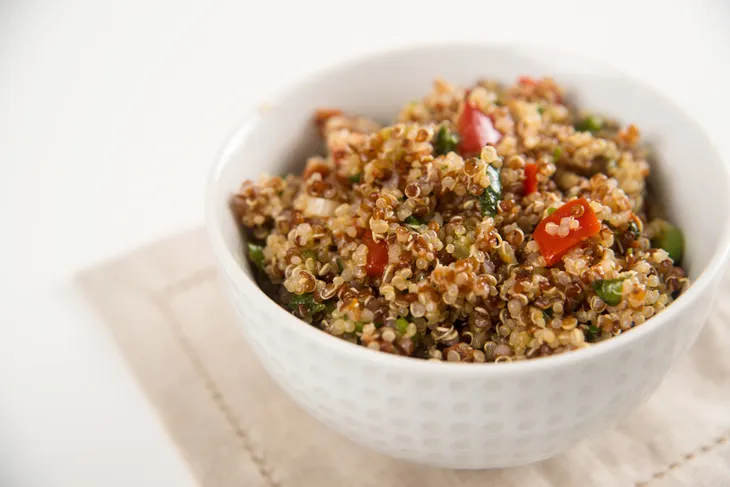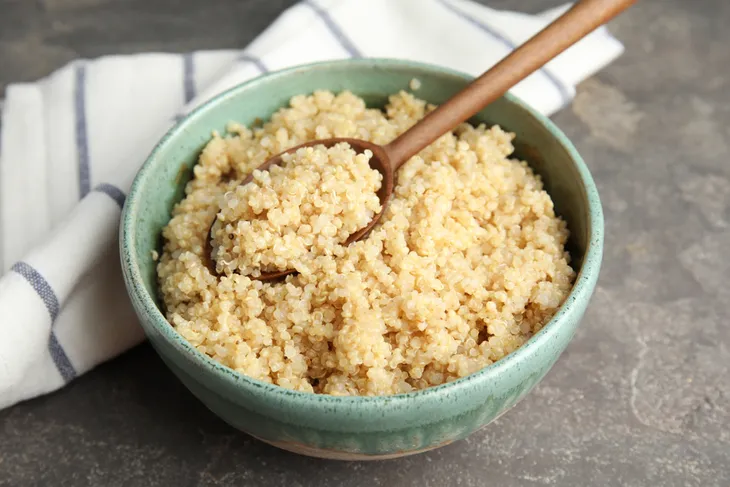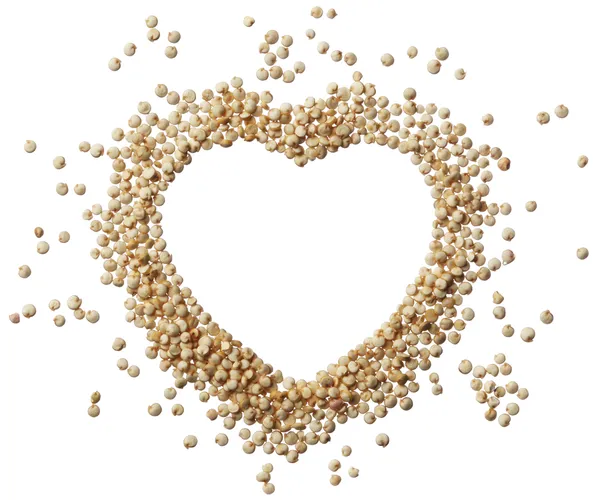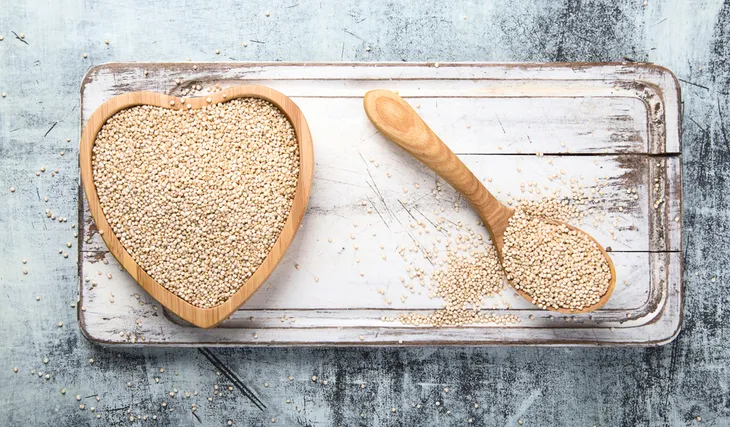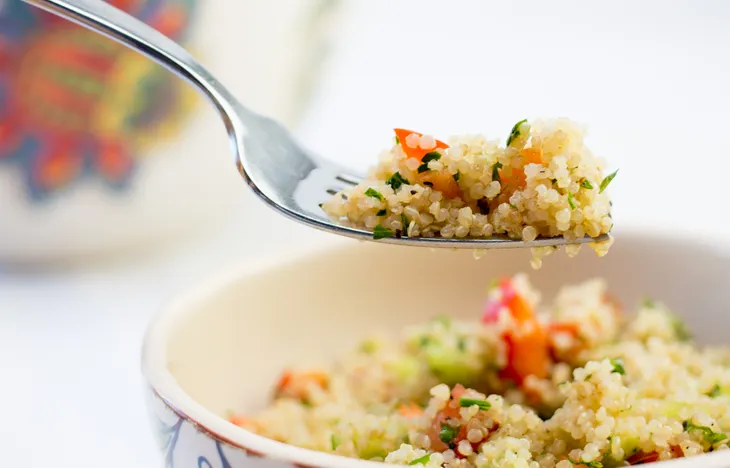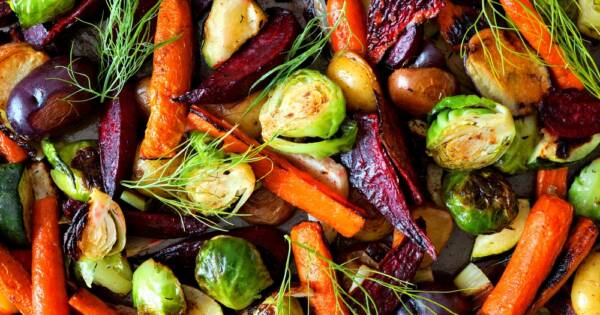Quinoa is a grain crop that is known for its edible seeds. While it’s become quite trendy as of lately, quinoa has actually been around for a long, long time. It was an important crop for the Inca Empire who used to refer to it as the “mother of all grains” as it was sacred to their culture. The people in South America are no stranger to quinoa. It’s been an important part of their diet for thousands of years, but has since grown in popularity in North America. It’s now commonly advertised as a superfood or popular health food.
So what’s the fuss all about? Quinoa sounds like a strange word (pronounced KEEN-wah)…it looks kinda different…what’s so super about this food? In addition to being extremely versatile in the kitchen, quinoa also has some pretty incredible health benefits!
Full of Nutrients and Antioxidants
Although it’s commonly referred to as a grain, quinoa is actually a pseudo-cereal which basically means it’s more like a seed than a grain, but it’s eaten and treated like a grain. With that being said, quinoa contains more vitamins, nutrients, and antioxidants than any other grain. These days quinoa isn’t hard to come by in grocery stores and in restaurants and there’s a reason for it! It’s super healthy to eat, is easy to prepare and is the perfect substitute for less health conscious options like rice or potato.
There are three main types of quinoa: red, white, and black. They are all super nutritious. According to Healthline, 1-cup of any of these types of quinoa contains 8-grams of protein, 5-grams of fiber, as well as a good chunk of the daily recommended allowance for magnesium, manganese, phosphorus, folate, copper, iron, zinc, potassium, and vitamins B1, B2 and B6.
Another reason quinoa is so healthy is because it is high in antioxidants, “which are substances that neutralize free radicals and are believed to help fight aging and many diseases,” writes Healthline. The source refers to a study which compared antioxidant levels in five cereals (3 pseudo-cereals and 2 legumes) and ultimately found quinoa to have the highest amount of them all.
High in Protein
Quinoa is a rich source of complete protein, particularly for a grain. The secret is lysine, a rare amino acid not found in many other grains, which make the protein levels in quinoa comparable to those in milk. Women’s Health points out that quinoa is also a “complete protein” which basically means it has all nine essential amino acids the body needs. This is much better than other similar plant-based amino acids that only have a few.
“Incorporating just 1-cup of quinoa a day into something like a grain bowl with other veggies or adding it to homemade soup will add 8-grams of protein,” says nutritionist Maggie Michalczyk, MS, RD, to Women’s Health.
Regulate Blood Sugar Levels
Maintaining healthy blood sugar levels is super important for diabetics, and it’s important for preventing type 2 diabetes. While there are tons of foods that wreak havoc on our blood sugar levels, there are some that help regulate them. Quinoa is one of the latter and it’s all thanks to its low glycemic index. “Quinoa has a low glycemic index, which is a measure of how quickly a food will raise your blood sugar,” says Michalczyk to Women’s Health. This helps lower the risk of diabetes and heart disease because foods with high glycemic index are what contribute to obesity, a huge risk factor in both of these conditions.
While quinoa has a low glycemic index of about 53, Healthline warns that it’s still high in carbs, so you wouldn’t want to eat too much of it, especially if you’re on a low-carb diet.
Promotes a Healthy Gut
Similar to how foods like quinoa and avocados have become more trendy in the health world, people have also started paying more attention to their gut health. It might sound strange, but our gut actually has a major impact on our overall health. It’s important to keep it nice and balanced with good and bad bacteria. One of the best things for our gut are prebiotics which are “indigestible fiber compounds that work with probiotic enzymes to become ‘fuel’ for the beneficial bacteria living in your gut,” explains Dr. Axe. The source notes that prebiotics have been linked with lowered disease risk, lower inflammation levels and a better functioning immune system.
In 2016 a study looked at how quinoa functioned as a prebiotic. “Scientists found that both of these pseudocereals (which they referred to as common superfoods) have prebiotic potential and can serve to improve gastrointestinal health by balancing the levels of good bacteria functioning there,” writes Dr. Axe. The butyrate in quinoa gives in the ability to fight against inflammatory gut diseases like IBS, Crohn’s and ulcerative colitis. It also contains succinic acid which is another anti-inflammatory nutrient that increases gut health.
Quinoa is high in phytic acid which makes it hard for the body to absorb all its amazing nutrients. The best way to combat this is by soaking it in water before using it.
Reduces Migraines
There’s nothing worse than suffering from a nasty headache, or even worse, a migraine. If you’re so unlucky to have experienced a migraine, then you’ll know just how awful it can be. Thankfully, there is hope for relief! Studies have found that riboflavin, a member of the B vitamin family, is able to not only reduce but eliminate and prevent migraines.
According to Chatelaine, it’s able to do this by improving the transportation of oxygen into the cells. So what does that have to do with quinoa? Well, quinoa is super high in riboflavin which means it’s great for relieving migraines and preventing them from happening in the first place.
Quinoa is Gluten-Free
We live in a world where most people are making an effort to eat less gluten. Luckily, the options for people with Celiac disease or those who prefer to eat gluten-free are endless. However, they aren’t all healthy. The best way to eat a gluten-free diet is with foods that are naturally gluten-free, like quinoa! Other options are usually filled with refined starches and no healthier than junk food.
Healthline cites studies which have shown that quinoa is a much healthier gluten-free ingredient than other options like tapioca, potato, corn and rice flour as it brings so many more nutrients and antioxidants to the table. While quinoa is technically a seed, it’s treated like a grain but since it’s unrelated to wheat it becomes the perfect substitute for pasta, wheat flour, oatmeal, and so much more. Better yet, it’s totally versatile! You can grind, boil, bake, steam, and even fry quinoa.
Promotes Bone Growth
Quinoa promotes good and healthy bone growth and is able to do so because it contains protein and all nine essential amino acids “used by the body as building blocks for the development of muscle tissue and necessary metabolic enzymes,” writes Chatelaine. When it comes to the protein content, this contributes to the absorption of “calcium into the bones and the development of collagen, as well as for the growth factors involved in healthy growth of the bone matrix.”
High in Iron
Yet another nutrient that quinoa contains lots of is iron. Iron is necessary for our overall health because it helps our body keep the red blood cells nice and healthy which then assists with hemoglobin formation. “Iron carries oxygen from one cell to another and supplies oxygen to our muscles to aid in their contraction,” writes MindBodyGreen. “Iron also increases brain function because the brain takes in about 20-percent of our blood oxygen.”
The source then goes on to list some of the biggest benefits of an adequate amount of iron in our body, which includes: neurotransmitter synthesis, regulation of body temperature, aids in enzyme activity and energy metabolism.
Magnesium for Heart Health
In addition to being high in fiber, antioxidants and all kinds of nutrients, quinoa is super high in magnesium which means it’s great for our cardiovascular health. One of it’s biggest benefits is that it’s able to prevent hypertension “through its ability to relax the small muscles that clamp down on our blood vessels.” To back this claim up, Chatelaine points out that research has found that a magnesium deficiency can increase the hormone (angiotensin II) which raises blood pressure, putting our heart health at risk.
It also has tons of other benefits. “Magnesium is important for muscle contraction and relaxation, as well as bone health, and iron is extremely important for your red blood cells because it helps to carry oxygen from your lungs to the rest of your body,” says Michalcyzk to Women’s Health.
May Help Fight Cancer
Anyone who is a health nut like us knows that any food that contains lots of antioxidants comes loaded with tons of benefits, including cancer fighting properties. Well, quinoa is no different. Dr. Axe explains that there are many specific nutrients found in quinoa that give it the potential to fight against cancer. First up, it contains saponin. While saponin is quite controversial, it has shown promising results when tested on cancer cells. In reality, saponin is the “detergent” that naturally occurs on plants that we wash off before eating. This is why quinoa foams slightly when it’s being rinsed.
Despite the fact that they are sometimes seen as an anti-nutrient, Dr. Axe explains that they have “caused cell death in glioblastoma (aggressive brain cancer), leukaemia and lymphoma cells in the lab. Their permeability (meaning their ability to travel through various organ linings) is actually one factor in their potential power against cancer.”
The next important nutrient found in quinoa is lunasin. It’s a peptide with a number of health benefits, one of those being its ability to break apart cancer cells. What’s even better is that when examined through lab and animal tests, lunasin has shown to kill cancer cells and leave healthy cells untouched. “The lunasin found in Chenopodium quinoa is considered bioactive, which simply means that eating quinoa is a useful way to have this nutrient actively operate in your body,” writes the source.
Lastly, quinoa contains quercetin, which has been shown to fight free radical damage associated with a number of diseases and stop the spread of lung cancer. It is the ingredient that makes quinoa an anti-inflammatory food.
May Assist in Weight Loss
There is no magic pill for weight loss or trendy diet that will can solve all of our weight problems. There are, however, certain foods that can help us in our weight loss journey by boosting our metabolism and reducing appetite. The trick to losing weight is to eat these types of healthy foods and exercise regularly. A perfect example of a food that not only helps keep us full for longer periods of time, boosts our metabolism, and is chock full of nutrients is quinoa!
Quinoa is high in protein which is what helps keep us feeling nice and full throughout the day so that we don’t snack on unhealthy foods and helps boost your metabolism. It’s also high in fiber which “may increase feelings of fullness, making you eat fewer calories overall,” writes Healthline. “The fact that quinoa has a low glycemic index is another important feature, as choosing such foods has been linked to reduced calorie intake.”
High in Fiber
For the most part, a lot of us aren’t eating enough fiber and fiber is super important! It’s what keeps things moving along, if ya know what I mean! Luckily, there are lots of foods that are high in fiber and quinoa is one of them. In addition to helping regulate bowel movements, quinoa is low in fat and sugar, but contains complex carbs which means it won’t cause that yucky bloated feeling.
“Most Americans aren’t meeting the daily recommended amount of fiber [that would be 25 to 28-grams per day for an adult woman, according to the Institute of Medicine’s dietary guidelines], so cooking with quinoa is a great way to get more,” says Maggie Michalczyk, MS, RD, to Women’s Health.
An added bonus that comes from eating more fiber? It helps prevent gallstones. Chatelaine explains that because quinoa is high in insoluble dietary fibre, it’s able to reduce the stagnation “of bile and lower the total blood triglycerides, which are two of the major components to gallstone formation.” Also, quinoa is a great gluten-free fiber option for those who can’t have gluten.
